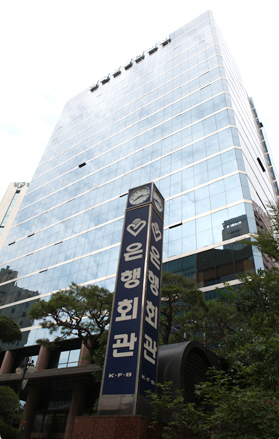Chairman Ha Yung-ku of the Korea Federation of Banks (KFB) said he will help banks find their way out of Korea and set up operations overseas. Domestic banks have been plagued by interest rates at home restricting their earnings.
The head of the bankers association said he will do everything in his power this year to help the member banks of the federation boost their earnings because their domestic operations are severely limited due the interest rate issue.
Chairman Ha promised to roll up his sleeves to find a means to provide support to the banks to expand their earnings by boosting either their non-banking sector or finding new growth engines at home and overseas.
He said the only way he can see banks boosting their earnings is either increasing fees charged on their services or to set up operations in foreign countries, where they can make profits from their operations.
Japanese banks make around 30 percent of their total earnings from profits and fees from their overseas operations, compared to only 10 percent for Korean banks on average, he said.
But he cautioned that the banks cannot raise the fees without providing anything in return for consumers. He said they first have to enhance the quality of their services and diversify them before raising the fees. He pointed out the fees from the sale of bancassurance and other funds can’t be enough, and they have to find other services to charge fees on, such as foreign exchange derivative products and consultation services.
To change the public’s understanding of the fees charged by the banks for their services, the chairman said KFB will first analyze current fees charged by banks and how foreign banks are doing abroad.
KFB plans to sign at least four MOUs with banker associations overseas, with Mongolia being one of them, this year to pave the way for Korean banks to expand their overseas operations.
He said Southeast Asia and Central Asia will be on the short list of KFB’s targets. With Mongolia, KFB will not only sign an MOU, but plans are in place to hold a forum in Korea on Mongolia’s financial industry in February and policies for foreign financial institutions operating in Mongolia. KFB has already signed MOUs with eight countries including the U.S., Japan, Russia, China, Uzbekistan, Vietnam, Myanmar and the United Arab Emirates, and will look forward to signing similar instruments with 10 more banking associations abroad. KFB will hold talks with ambassadors of those nations assigned to Seoul and open other communication channels this year.
Founded in 1928, the Korea Federation of Banks (KFB) represents financial institutions conducting banking and related business in Korea, serving as the voice of the nation’s $2.01 trillion (or 2,103 trillion won) banking industry and its 135,259 employees.
The KFB consists of 21 full members comprising seven nationwide commercial banks, five specialized banks, six regional banks and four related financial institutions, as well as 39 foreign bank branches as associate members.
Banks are the lifeblood of the economy. As such, it is important that Korea’s banking industry grows in both scope and sophistication so that it may better serve the real sector and in turn promote balanced economic and social development.
Fulfilling this critical role has been challenging, as the Korean banking industry continues to seek renewed momentum amid low growth and interest rates.
To assist its members in navigating this testing environment in the direction of sustainable growth and profitability, the KFB has committed itself to advocating on behalf of the banking industry regarding key issues, and in particular to push for improvements in regulations relevant to the banking sector.

A view of the building where the federation has offices in Seoul.(Photos:KFB)
